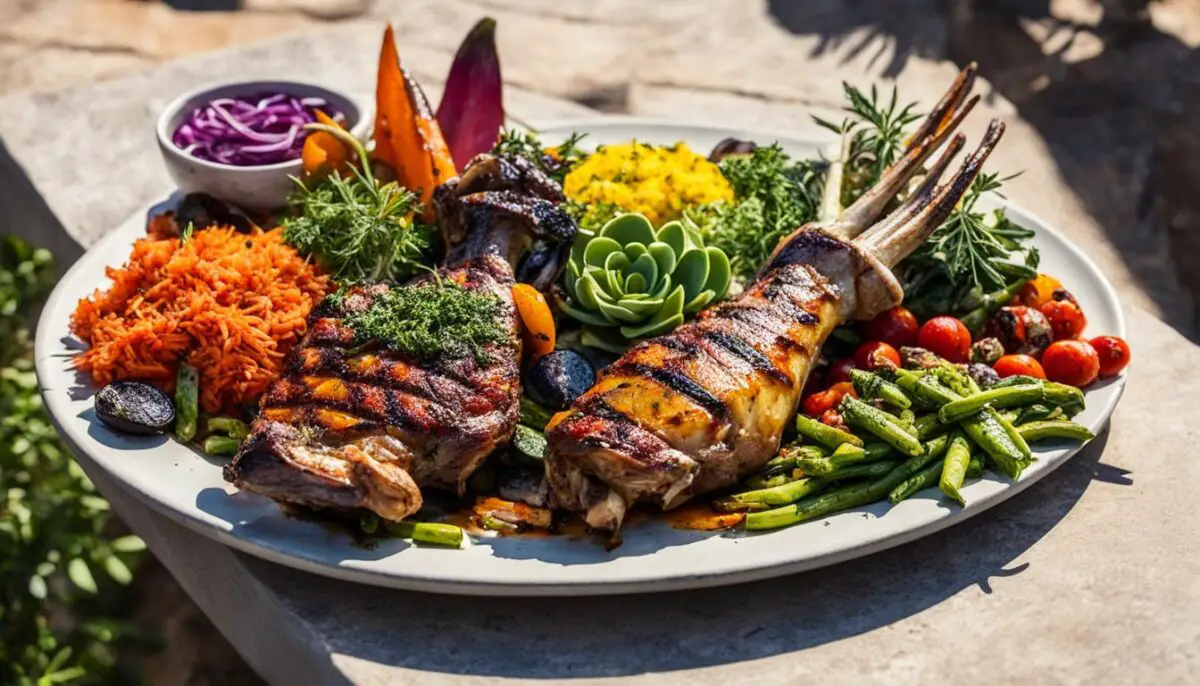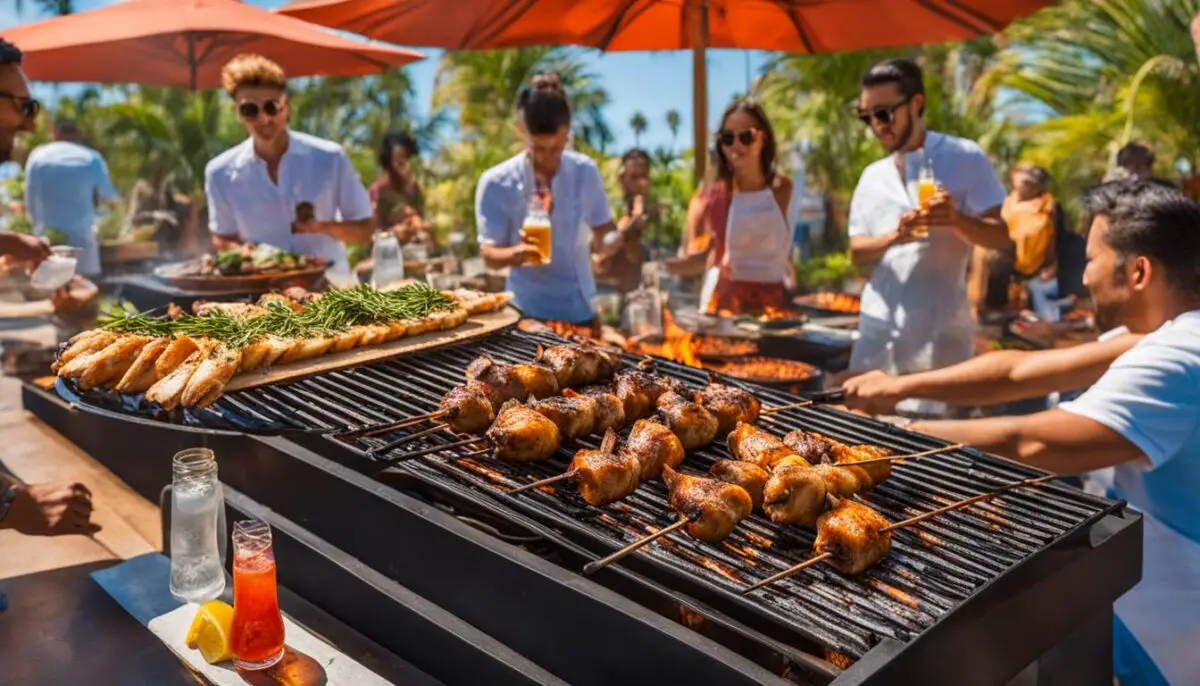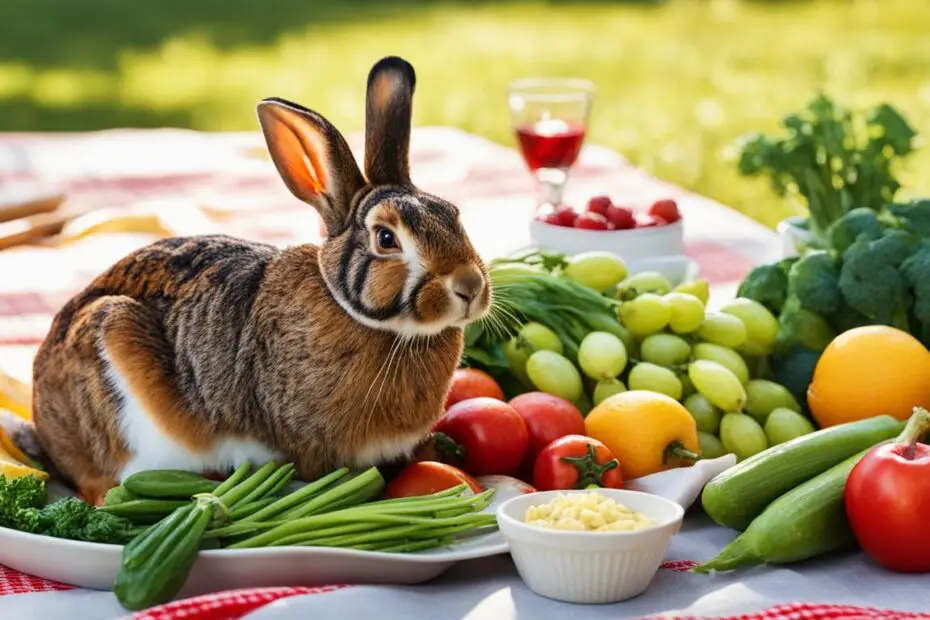Are you wondering if it’s safe to indulge in rabbit meat during the summer months? There’s a lot of misinformation out there, but we’re here to set the record straight. Contrary to popular belief, consuming rabbit meat in the summer is perfectly safe as long as you follow a few guidelines.
Key Takeaways:
- Contrary to popular belief, it is safe to eat rabbit meat in the summer.
- Proper handling and cooking techniques ensure the safety of rabbit meat.
- Rabbit meat is a nutritious and lean source of protein.
- Grilling is a popular cooking method for summer rabbit dishes.
- Follow food safety guidelines to enjoy rabbit meat without any concerns.
The Nutritional Value of Rabbits
Rabbit meat is not only safe to eat in the summer but also offers several nutritional benefits. It is a lean source of protein, low in fat, and rich in essential nutrients such as vitamins B12, B6, and niacin. Rabbit meat is also a good source of minerals like iron, phosphorus, and selenium. It is a healthy alternative to other meats, especially for those looking to reduce their intake of red meat.
Incorporating rabbit meat into your summer diet can provide you with a delicious and nutritious source of protein. Whether you choose to grill it, roast it, or include it in salads and stews, rabbit meat can add variety to your meals while offering numerous health benefits. Let’s explore the nutritional value of rabbits in more detail:
High Protein Content
Rabbit meat is a great source of protein, containing all the essential amino acids that your body needs for growth, repair, and maintenance. Consuming adequate protein is essential for building and repairing tissues, strengthening the immune system, and supporting hormone production. Compared to other meats, rabbit meat is lower in fat and calories, making it an ideal choice for those watching their weight or looking to maintain a healthy lifestyle.
Rich in Essential Vitamins
Rabbit meat is packed with essential vitamins that contribute to overall health and well-being. It is particularly high in vitamin B12, which is important for red blood cell production and neurological function. Vitamin B6 found in rabbit meat helps maintain brain health, while niacin supports energy metabolism and digestive health.
A Good Source of Minerals
Rabbit meat is not only a good source of vitamins but also provides important minerals necessary for optimal body function. Iron is crucial for transporting oxygen throughout the body and preventing iron-deficiency anemia. Phosphorus is essential for healthy bones and teeth, while selenium acts as a powerful antioxidant, protecting cells from damage.
By incorporating rabbit meat into your summer diet, you can enjoy a flavorful protein source while reaping the nutritional benefits it provides. Whether you’re grilling rabbit skewers, adding rabbit meat to a summer salad, or trying out new rabbit recipes, you’ll be fueling your body with essential nutrients while savoring the taste.

To further understand the nutritional value of rabbits, here’s a table highlighting its key nutrients:
| Nutrient | Quantity per 100g |
|---|---|
| Protein | 21g |
| Fat | 2.5g |
| Calories | 165 |
| Vitamin B12 | 3.5mcg |
| Vitamin B6 | 0.5mg |
| Niacin | 3.8mg |
| Iron | 2.2mg |
| Phosphorus | 222mg |
| Selenium | 30.7mcg |
As you can see, rabbit meat offers a well-balanced combination of protein, vitamins, and minerals, making it a nutritious addition to your summer menu. Embrace the culinary versatility of rabbit meat and explore the delicious recipes you can create while enjoying its many health benefits.
Tips for Cooking Rabbit Meat in Hot Weather
When it comes to cooking rabbit meat in hot weather, a few tips can ensure the best results. Here are some recommendations to make your rabbit dishes for summer truly delicious:
Proper Storage and Handling
To prevent spoilage, it’s crucial to store and handle rabbit meat correctly. Keep the meat refrigerated until you’re ready to use it, and follow safe food handling practices to maintain its freshness and quality.
Grilling
Grilling is a popular cooking method for summer rabbit dishes. The smoky flavor and charred texture enhance the natural taste of the meat. Before grilling, consider marinating the rabbit meat to add extra flavor and help keep it moist. You can experiment with various marinades and rubs to create unique and delicious rabbit recipes for hot weather.
Alternative Cooking Methods
Aside from grilling, you can also explore other cooking methods based on your recipe preferences. Roasting, braising, or stir-frying are great options that can bring out different flavors and textures in the rabbit meat. These methods allow for versatility and creativity in preparing rabbit dishes for the summer.
Tip: Grilling is a wonderful way to cook rabbit meat in hot weather, but don’t limit yourself! Get creative and experiment with various cooking techniques to unlock the full potential of this versatile ingredient.
Popular Summer Rabbit Recipes
If you’re looking for inspiration, here are a few popular summer rabbit recipes to try:
- Grilled Rabbit Skewers: Marinate rabbit meat in your favorite seasoning, thread it onto skewers, and grill until cooked to perfection. Serve with fresh vegetables for a light and flavorful meal.
- Rabbit Salad: Combine grilled or roasted rabbit meat with a variety of greens, herbs, and dressing for a refreshing summer salad. Add some fruits and nuts for extra texture and flavor.
- Rabbit Burgers: Shape ground rabbit meat into patties, grill or pan-sear them, and serve on buns with your favorite toppings. This unique twist on a classic burger is sure to impress.
So, don’t let the hot weather discourage you from cooking delicious rabbit dishes this summer. With these tips and recipe ideas, you can enjoy the flavors of rabbit meat while satisfying your culinary creativity.

Common Myths about Eating Rabbits in the Summer
There are several common myths surrounding the consumption of rabbits in the summer. One of them is the belief that rabbits are inedible during the warmer months due to being parasite and disease-ridden. While it is true that rabbits can host parasites such as intestinal worms and warbles, these parasites do not pose a risk to humans unless the raw rabbit guts are consumed. Rabbits may also carry fleas, but avoiding rabbits in the summer does not necessarily reduce the risk of contracting tularemia, a potential disease transmitted by fleas. It is important to separate fact from fiction and rely on factual information when it comes to consuming rabbit meat.
Seasonal Rabbit Consumption Guidelines
When it comes to enjoying rabbits in the summer, it’s essential to follow proper food safety guidelines to ensure a safe and delicious experience. By sourcing rabbit meat from reputable sources and taking appropriate measures in handling and cooking, you can confidently savor the flavors of rabbit dishes during the warm months.
Here are some guidelines to keep in mind:
- Source from reliable suppliers: When purchasing rabbit meat, choose reputable suppliers known for their high-quality products. This ensures that you’re getting fresh and safe meat for consumption.
- Inspect for abnormalities: Before cooking, carefully examine the rabbit meat for any signs of illness or abnormalities. Look for lesions on the liver or other visible signs that may indicate spoilage. If you notice anything suspicious, it’s best to discard the meat.
- Practice safe handling: Proper handling of rabbit meat is crucial to prevent contamination and foodborne illnesses. Keep the meat refrigerated until you’re ready to use it, and ensure all utensils and surfaces are clean and sanitized.
- Cook thoroughly: To eliminate any potential pathogens and ensure food safety, it’s important to cook rabbit meat thoroughly. Cook the meat to an internal temperature of at least 165 degrees Fahrenheit (74 degrees Celsius) to kill any harmful bacteria or parasites that may be present.
- Experiment with recipes: The summer season offers ample opportunities to explore various rabbit dishes. Whether you prefer grilling, roasting, or stir-frying, let your culinary creativity shine with delicious rabbit recipes. Marinating the meat beforehand can add extra flavor and enhance the overall dining experience.
By adhering to these guidelines, you can confidently include rabbit meat in your summer culinary adventures. Remember, proper food safety practices are essential to ensure a delightful and risk-free dining experience.
Conclusion
In conclusion, there is no scientific evidence to support the belief that it is unsafe to eat rabbits in the summer. While rabbits can host parasites and fleas, proper handling and cooking techniques ensure the safety of the meat. Rabbit meat offers nutritional benefits and can be enjoyed in various delicious recipes during the hot summer months. By following food safety guidelines and relying on factual information, you can confidently include rabbit meat in your summer meals. So fire up the grill, try out some new recipes, and savor the taste of rabbit meat all summer long.
FAQ
Can you eat rabbits in the summer?
Yes, it is safe to eat rabbit meat in the summer.
Are there any summer rabbit recipes?
Yes, there are plenty of delicious rabbit dishes that you can enjoy during the summer.
Is it safe to eat rabbits in the summer?
Yes, as long as the rabbit meat is properly handled and cooked to a safe temperature.
What is the nutritional value of rabbits?
Rabbit meat is a lean source of protein and rich in essential nutrients like vitamins B12, B6, and niacin, as well as minerals like iron, phosphorus, and selenium.
How can I cook rabbit meat in hot weather?
Grilling, roasting, braising, and stir-frying are popular cooking methods for rabbit meat in hot weather.
What are some rabbit dishes for summer?
Grilled rabbit skewers, rabbit salad, and rabbit burgers are popular rabbit dishes for the summer.
What are some common myths about eating rabbits in the summer?
There are myths about rabbits being unsafe to eat due to parasites and fleas, but these myths are not supported by scientific evidence.
How can I safely consume rabbits in the summer?
By sourcing rabbit meat from reputable sources, properly storing and handling the meat, and cooking it to a safe temperature.


